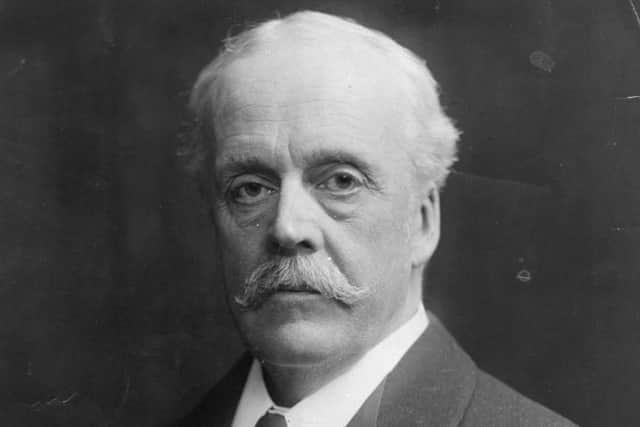Who was Arthur Balfour, the Scottish politician who was instrumental in the creation of Israel?
He is the Scottish politician who has been described as instrumental in the creation of Israel through the Balfour Declaration – which supported a “national home for the Jewish people”.
But who was Arthur Balfour and how key was he in creating the Jewish state which is now at war with Gaza?
Advertisement
Hide AdAdvertisement
Hide AdThe Balfour Declaration – which was described in the letter accompanying it as a “declaration of sympathy with Jewish Zionist aspirations” – was signed in 1917 and sent from Mr Balfour to Lord Rothschild, a leader of the British Jewish community.


Balfour, who was born at Whittingehame House, near East Linton in East Lothian, inherited the estate in 1856 and first entered parliament in 1874 as the Conservative member for Hertford. His father and grandfather had both been Scottish MPs.
He quickly progressed through various government posts including Secretary for Scotland, Secretary for Ireland, First Lord of the Treasury and, on the death of his uncle Lord Salisbury, Leader in the Commons. Five years later, in July 1902, he became Prime Minister, resigning in 1905.
He then returned to government in 1916 to serve as Lloyd George's Foreign Secretary. It was when he held the post of foreign secretary, that he wrote the Balfour Declaration in 1917, which was the first public expression of support for a “national home for the Jewish people” and is believed to have been signed in the library at Whittingehame House.
“His Majesty’s Government view with favour the establishment in Palestine of a national home for the Jewish people, and will use their best endeavours to facilitate the achievement of this object, it being clearly understood that nothing shall be done which may prejudice the civil and religious rights of existing non-Jewish communities in Palestine, or the rights and political status enjoyed by Jews in any other country,” the declaration said.


However, by the time of the creation of the state of Israel, in the late 1940s, the British Government, which held a colonial mandate for Palestine, opposed both the creation of a Jewish state and an Arab state in Palestine as well as unlimited immigration of Jewish refugees to the region in a bid to preserve relations with Arabs in Palestine.
The United Nations adopted Resolution 181, also known as the Partition Resolution, that would divide Great Britain’s former Palestinian mandate into Jewish and Arab states in May 1948 when the British mandate was scheduled to end.
Professor Thomas Weber, chair in history and international affairs at Aberdeen University, argues that the Middle East conflict predates the Balfour Declaration. He said: “If you take 1948 and what followed as a starting point and then look for antecedents for what people either see as a miracle or a disaster, it makes sense to look at the Balfour Declaration and to see the declaration as a major turning point that set the region on course for 1948.
Advertisement
Hide AdAdvertisement
Hide Ad"But, from a WWI perspective, the future of Jewish life in the Middle East looked rather indeterminate. Britain made competing promises to a number of different populations for tactical and strategic gain, both in the region and elsewhere, of which Balfour's promise to the Jewish people of some kind of national self determination in parts of Palestine was one among others. And it is worth stressing that at least in the decade leading up to 1948, Britain did little to create a national home for Jews in Palestine.”
Prof Weber points to a Zionist campaign of political violence, using terrorism tactics, against the British to achieve national independence.
“Nevertheless, the Balfour Declaration helped to rally Jewish opinion behind Zionism and it is reasonable to argue that the Balfour Declaration boosted support for Zionism amongst Jews,” he said. “Even more importantly, through the inclusion of the Balfour Declaration in the Mandate political settlement after WWI, the British at least initially helped to create relative fertile ground for Zionism to flourish in Palestine.
“I would see here the main link between the Balfour Declaration and the ultimate independence of Israel, even if Britain ultimately performed a U-turn on their policy towards the Jews in Palestine. However, by that time they had helped facilitate a strong Zionist independence movement, whether they liked it or not.”
The Balfour Declaration has not been without its controversy. The British government acknowledged in 1939 that the local population's wishes and interests should have been taken into account, and recognised in 2017 that the declaration should have called for the protection of the Palestinian Arabs’ political rights.
Balfouria, a moshav in northern Israel, along with many streets in Israel, are named after Balfour.
Comments
Want to join the conversation? Please or to comment on this article.
